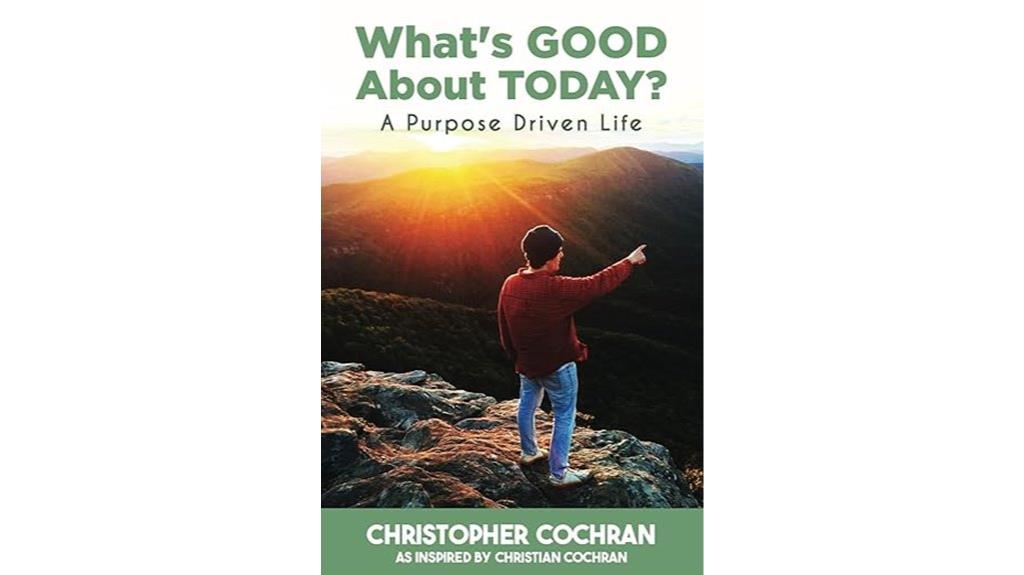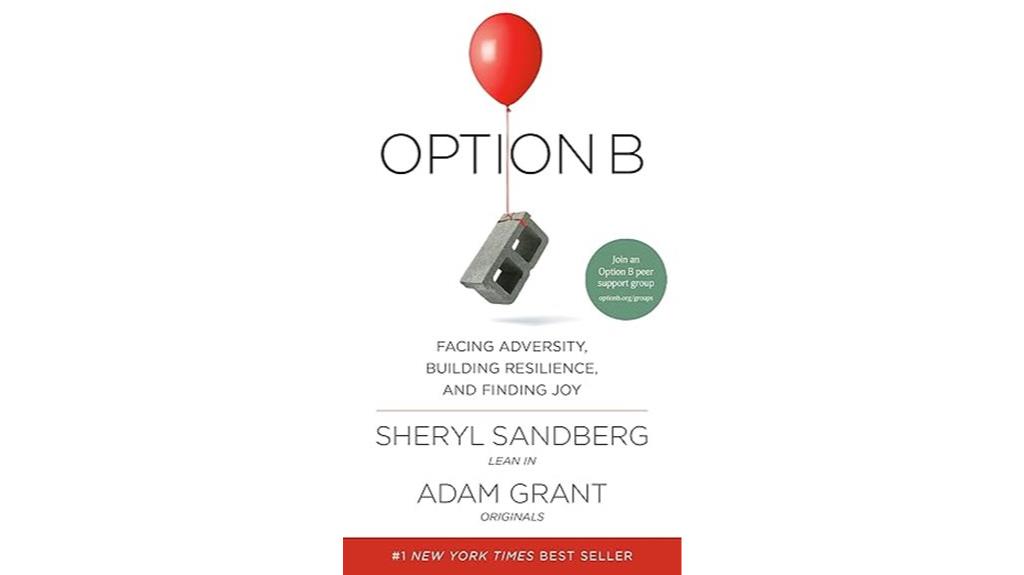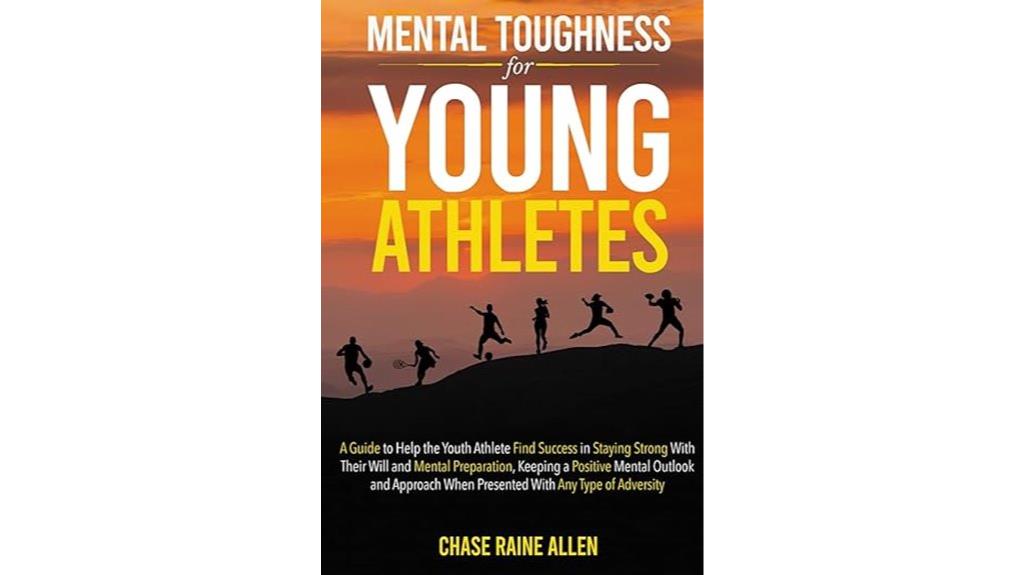Table of Contents Show
There may be products. Products are independently selected by our editors. We may earn an affiliate commission from the links with no charge to you, example: as Amazon Affiliate.
We’ve identified three transformative self-help books that’ll equip you with powerful strategies for conquering life’s toughest challenges in 2025. “What’s GOOD About TODAY?” offers inspiring lessons in resilience, while “Option B” provides research-backed approaches to overcoming adversity. For younger readers, the “Mental Toughness Guide for Young Athletes” delivers practical tools that extend beyond sports. Let’s explore how these game-changing resources can help you build unshakeable mental strength and resilience.
Key Takeaways
- “Option B” offers research-backed strategies for resilience building while validating grief experiences through personal narratives and actionable advice.
- “Mental Toughness Guide for Young Athletes” provides structured daily exercises and real-world examples applicable beyond sports for comprehensive resilience development.
- “What’s GOOD About TODAY?” presents practical life lessons for finding positivity during adversity through compelling storytelling and daily applications.
- All three books combine personal stories with actionable tools, making complex resilience concepts accessible and implementable for different life challenges.
- Each book emphasizes building support networks while offering specific exercises for stress management and emotional well-being across various situations.
Whats GOOD About TODAY?: A Purpose Driven Life

For those seeking inspiration through real-life stories of resilience and optimism, “What’s GOOD About TODAY?: A Purpose Driven Life” offers a compelling journey through Christian’s remarkable legacy of faith, family values, and unwavering positivity.
We’ve found this beautifully written tribute to be both heartbreaking and uplifting. Christian’s character as a “Modern Day Saint” shines through in every page, demonstrating how one person’s selflessness and strength can impact countless lives. The narrative’s engaging style makes it impossible to put down, while its profound message reminds us to find good in each day despite life’s challenges.
Best For: Readers seeking inspiration and life lessons through a powerful true story of faith, resilience, and finding daily purpose despite adversity.
Pros:
- Beautifully written narrative that skillfully balances heartbreak with hope and inspiration
- Compelling portrayal of Christian’s exemplary character and lasting impact on others
- Practical lessons about finding good in each day that readers can apply to their own lives
Cons:
- May be emotionally challenging for those dealing with recent loss or grief
- Religious themes might not resonate with all readers
- Some may find the positive focus challenging to maintain in their own difficult circumstances
Option B: Facing Adversity, Building Resilience, and Finding Joy

People experiencing grief and adversity will find solace in “Option B: Facing Adversity, Building Resilience, and Finding Joy.” While dealing with her husband’s sudden death, author Sheryl Sandberg, alongside psychologist Adam Grant, shares powerful insights about managing loss and building resilience.
We love how this book validates all forms of grief while teaching that resilience can be developed. Instead of asking “What can I do?”, we learn to take specific actions to support others. The practical strategies for healing and parenting through grief, backed by research, make this an invaluable resource. Despite acknowledging that some pain never fades, Option B shows us that personal growth and joy remain possible.
Best For: Anyone navigating grief, loss, or major life challenges who seeks practical guidance on building resilience and finding hope while processing their emotions.
Pros:
- Combines personal narrative with research-backed strategies for developing resilience
- Provides specific, actionable advice for both those grieving and those supporting others
- Validates all forms of grief while offering hope and practical steps toward healing
Cons:
- May be emotionally challenging for those in early stages of acute grief
- Some readers might find the corporate success perspective less relatable
- Focus on sudden loss may not fully address other forms of grief and adversity
Mental Toughness Guide for Young Athletes

Young athletes seeking to build mental fortitude will find invaluable guidance in “Mental Toughness for Young Athletes,” an extensive guide that breaks down psychological resilience into practical, actionable steps.
We’re impressed by how this book combines daily exercises, breathing techniques, and visualization practices with real stories of athletes who’ve overcome adversity. It’s not just about sports performance – the guide tackles academic pressure, social media challenges, and life changes. What sets it apart is its holistic approach, offering a structured 30-day plan while including essential guidance for parents and coaches who play pivotal roles in young athletes’ development.
Best For: Young athletes aged 12-18 looking to build mental resilience and their parents/coaches who want to support their development both in sports and life.
Pros:
- Provides practical, daily exercises and a structured 30-day plan for developing mental toughness
- Includes real-life examples and relatable stories from athletes that resonate with young readers
- Takes a comprehensive approach by addressing both sports performance and life challenges
Cons:
- May be too structured for athletes who prefer a more flexible approach to mental training
- Some exercises might require guidance from adults for proper implementation
- Could overwhelm young athletes who are just beginning their mental toughness journey
Factors to Consider When Choosing Self-Help Books About Overcoming Adversity and Finding Strength
When choosing self-help books about overcoming adversity and finding strength, we’ll want to evaluate the author’s expertise and how their personal experiences create a genuine connection with readers. We should look for books that offer practical, research-backed mental tools we can immediately apply to our own challenges. It’s also essential that we select guidance that emphasizes building a strong support network while working through difficult times.
Author’s Expertise and Credibility
Before selecting a self-help book about overcoming adversity, it’s important to evaluate the author’s expertise and credibility. We should look for authors who possess strong professional backgrounds in psychology, counseling, or related fields, as their expertise adds weight to their insights and recommendations.
We’ll want to verify their educational qualifications, relevant certifications, and track record of previous publications. Authors who’ve personally faced similar challenges often provide more authentic and relatable guidance. It’s also worth checking endorsements from respected mental health professionals and reading reviews of their earlier works.
Let’s prioritize authors who combine formal training with practical experience, as this blend typically results in more thorough and effective advice for overcoming life’s obstacles and building resilience.
Personal Connection and Relatability
A meaningful connection with a self-help book‘s content can greatly boost its effectiveness in guiding us through difficult times. When choosing a self-help book, we should look for stories and experiences that mirror our own challenges. Books like “Option B” succeed by validating our struggles through shared experiences of adversity and grief.
Personal anecdotes and real-life examples, such as those found in “Mental Toughness Guide for Young Athletes,” make lessons more relatable and actionable. We connect more deeply when authors share their own hardships, showing us tangible paths to resilience. The most impactful books often take holistic approaches, acknowledging that our challenges extend beyond single contexts. When we see our experiences reflected in these narratives, we’re more likely to find comfort, understanding, and practical solutions for growth.
Practical Application of Lessons
Beyond relating to a book’s content, the true value of self-help literature lies in our ability to put its teachings into practice. We recommend looking for books that offer clear, actionable strategies and structured programs, like 30-day plans, that help us integrate new habits systematically. The most effective titles provide specific exercises for stress management and resilience-building that we can implement in our daily routines.
When selecting a book, we should prioritize those that demonstrate how their principles apply across different life situations, from workplace challenges to personal relationships. Look for content that includes practical tools for supporting others, fostering better communication, and building stronger connections. These elements guarantee we’re not just reading about overcoming adversity but actively developing the skills to face it head-on.
Research-Backed Mental Tools
Strong mental tools backed by scientific research serve as essential criteria when selecting self-help books about resilience and strength. We recommend choosing books that incorporate proven techniques like daily visualization exercises and structured breathing practices, as these methods demonstrably boost confidence and resilience.
Look for titles that offer structured 30-day plans, which research shows effectively develop mental toughness and better coping strategies. We’ve found that books featuring real-life success stories tend to resonate more deeply and motivate lasting change. Additionally, prioritize resources that address your whole person—tackling academic, social, and emotional challenges together. The best self-help books will also guide you in building actionable support networks, showing you how to leverage specific assistance from family and peers during difficult times.
Support System Development Focus
When evaluating self-help books about resilience and strength, we recommend prioritizing titles that emphasize building robust support networks. Look for books that provide practical strategies on how to actively seek and maintain meaningful connections, rather than those offering generic advice about “reaching out.” The best resources will teach you how to identify specific types of support you need and how to effectively communicate these needs to others.
We’ve found that valuable self-help books should address the reciprocal nature of support systems, showing you how to both give and receive help. They should also explore ways to engage with broader communities and explain how diverse perspectives can enhance your resilience. Choose books that demonstrate how structured support networks directly impact stress reduction and emotional well-being during challenging times.
Conclusion
When the chips are down, we’ve got to find strength from somewhere. These three powerful books give us the tools and mindsets needed to face life’s toughest moments head-on. Whether you’re an athlete, professional, or someone seeking purpose, these reads will guide you through any storm. Let’s take the first step toward resilience and growth by picking up one of these transformative books today.








